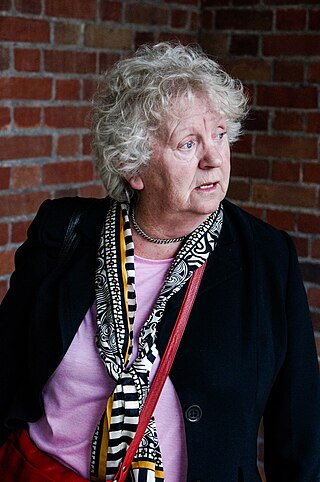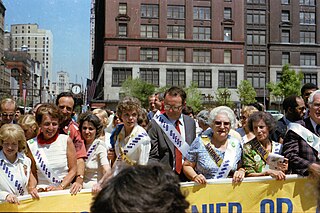Related Research Articles
Radical feminism is a perspective within feminism that calls for a radical re-ordering of society in which male supremacy is eliminated in all social and economic contexts, while recognizing that women's experiences are also affected by other social divisions such as in race, class, and sexual orientation. The ideology and movement emerged in the 1960s.

Robin Morgan is an American poet, writer, activist, journalist, lecturer and former child actor. Since the early 1960s, she has been a key radical feminist member of the American Women's Movement, and a leader in the international feminist movement. Her 1970 anthology Sisterhood Is Powerful was cited by the New York Public Library as "One of the 100 Most Influential Books of the 20th Century.". She has written more than 20 books of poetry, fiction, and nonfiction, and was editor of Ms. magazine.
Sex-positive feminism, also known as pro-sex feminism, sex-radical feminism, or sexually liberal feminism, is a feminist movement centering on the idea that sexual freedom is an essential component of women's freedom. They oppose legal or social efforts to control sexual activities between consenting adults, whether they are initiated by the government, other feminists, opponents of feminism, or any other institution. They embrace sexual minority groups, endorsing the value of coalition-building with marginalized groups. Sex-positive feminism is connected with the sex-positive movement. Sex-positive feminism brings together anti-censorship activists, LGBT activists, feminist scholars, producers of pornography and erotica, among others. Sex-positive feminists believe that prostitution can be a positive experience if workers are treated with respect, and agree that sex work should not be criminalized.

Shulamith Bath Shmuel Ben Ari Firestone was a Canadian-American radical feminist writer and activist. Firestone was a central figure in the early development of radical feminism and second-wave feminism and a founding member of three radical-feminist groups: New York Radical Women, Redstockings, and New York Radical Feminists. Within these radical movements, Firestone became known as "the firebrand" and "the fireball" for the fervor and passion she expressed towards the cause. Firestone participated in activism such as speaking out at The National Conference for New Politics in Chicago. Also while a member of various feminist groups she participated in actions including picketing a Miss America Contest, organizing a mock funeral for womanhood known as "The Burial of Traditional Womanhood", protesting sexual harassment at Madison Square Garden, organizing abortion speak outs, and disrupting abortion legislation meetings.

Sisterhood Is Powerful: An Anthology of Writings from the Women's Liberation Movement is a 1970 anthology of feminist writings edited by Robin Morgan, a feminist poet and founding member of New York Radical Women. It is one of the first widely available anthologies of second-wave feminism. It is both a consciousness-raising analysis and a call-to-action. Sisterhood Is Global: The International Women's Movement Anthology (1984) is the follow-up to Sisterhood Is Powerful. After Sisterhood Is Global came its follow-up, Sisterhood Is Forever: The Women's Anthology for a New Millennium (2003).

Nell McCafferty is an Irish journalist, playwright, civil rights campaigner and feminist. She has written for The Irish Press, The Irish Times, Sunday Tribune, Hot Press and The Village Voice.
Redstockings, also known as Redstockings of the Women's Liberation Movement, is a radical feminist nonprofit that was founded in January 1969 in New York City, whose goal is "To Defend and Advance the Women's Liberation Agenda". The group's name is derived from bluestocking, a term used to disparage feminist intellectuals of earlier centuries, and red, for its association with the revolutionary left.

Florynce Rae Kennedy was an American lawyer, radical feminist, civil rights advocate, lecturer, and activist.

New York Radical Women (NYRW) was an early second-wave radical feminist group that existed from 1967 to 1969. They drew nationwide media attention when they unfurled a banner inside the 1968 Miss America pageant displaying the words "Women's Liberation".

The National Organization for Women (NOW) is an American feminist organization. Founded in 1966, it is legally a 501(c)(4) social welfare organization. The organization consists of 550 chapters in all 50 U.S. states and in Washington, D.C. It is the largest feminist organization in the United States with around 500,000 members. NOW is regarded as one of the main liberal feminist organizations in the US, and primarily lobbies for gender equality within the existing political system. NOW campaigns for constitutional equality, economic justice, reproductive rights, LGBTQIA+ rights and racial justice, and against violence against women.

Alix Kates Shulman is an American writer of fiction, memoirs, and essays, and a prominent early radical activist of second-wave feminism. She is best-known for her bestselling debut adult novel, Memoirs of an Ex-Prom Queen, hailed by the Oxford Companion to Women's Writing as "the first important novel to emerge from the Women's Liberation Movement."

The Miss America protest was a demonstration held at the Miss America 1969 contest on September 7, 1968, attended by about 200 feminists and civil rights advocates. The feminist protest was organized by New York Radical Women and included putting symbolic feminine products into a "Freedom Trash Can" on the Atlantic City boardwalk, including bras, hairspray, makeup, girdles, corsets, false eyelashes, mops, and other items. The protesters also unfurled a large banner emblazoned with "Women's Liberation" inside the contest hall, drawing worldwide media attention to the Women's Liberation Movement.
Kathie Sarachild is an American writer and radical feminist. In 1968, she took the last name "Sarachild" after her mother Sara. Kathie coined the phrase "Sisterhood is Powerful" in a flier she wrote for the keynote speech she gave for New York Radical Women's first public action at the convocation of the Jeannette Rankin Brigade. This was a slogan that would become synonymous with the radical feminist movement in the years which followed. She was one of four women who held the Women's Liberation banner at the Miss America protest, and had her paper "A Program for Radical Feminist Consciousness-Raising" presented at the First National Women's Liberation Conference outside Chicago on November 27, 1968. She was a member of New York Radical Women. In February 1969, Kathie led a feminist group that was soon to be called Redstockings in their disruption of the New York State Abortion Reform Hearing, at which women first demanded to testify about their own abortions. In March of the same year, Redstockings held the first ever abortion speakout, which became a model for abortion rights activists across the United States.

The personal is political, also termed The private is political, is a political argument used as a rallying slogan of student movement and second-wave feminism from the late 1960s. In the context of the feminist movement of the 1960s and 1970s, it was a challenge to the nuclear family and family values. The phrase was popularized by the publication of a 1969 essay by feminist activist Carol Hanisch under the title "The Personal Is Political" in 1970, and has been repeatedly described as a defining characterization of second-wave feminism, radical feminism, women's studies, or feminism in general. It has also been used by some women artists as the underlying philosophy for their art practice.
Irene Peslikis was an American feminist artist, activist, and educator. She was one of the early founders and organizers in the women's art movement, especially on the east coast.

Sisterhood Is Forever: The Women's Anthology for a New Millennium is a 2003 anthology of feminist writings edited by Robin Morgan. It has more than fifty women contributing sixty original essays written specifically for it. It is the follow-up anthology to Sisterhood Is Global: The International Women's Movement Anthology (1984), which itself is the follow-up to Sisterhood Is Powerful: An Anthology of Writings from the Women's Liberation Movement (1970).
This is a Timeline of second-wave feminism, from its beginning in the mid-twentieth century, to the start of Third-wave feminism in the early 1990s.
Jenny Brown is an organizer in the women's liberation movement and the author of several books on feminism, reproductive rights, and labor. She works with National Women's Liberation, a radical feminist organization of dues-paying women.
References
- ↑ "Click here to support Stop Lucinda Cisler's Eviction organized by Jenny Brown". gofundme.com. Retrieved 2018-03-11.
- ↑ "Targeted Regulation of Abortion Providers". Guttmacher Institute. 2016-03-14. Retrieved 2018-03-11.
- 1 2 3 "Radical Feminism" (PDF).
- ↑ "Vassar Quarterly 1 April 1965 — Vassar Newspaper Archive". newspaperarchives.vassar.edu. Retrieved 2018-03-13.
- ↑ Stern, Robert A. M.; Stamp, Jimmy (2016). Pedagogy and Place:100 Years of Architecture Education at Yale. ISBN 9780300211924 . Retrieved 2019-02-14.
- ↑ "Vassar".
- 1 2 3 "Abortion law repeal (sort of): a warning to women. In NOTES FROM THE SECOND YEAR (1970)". Fair Use Repository. 1970. Retrieved 2018-03-11.
- ↑ Morgan, Robin; Morgan, Robin (1970), Sisterhood is powerful : an anthology of writings from the women's liberation movement ([1st ed.] ed.), Random House, retrieved 28 March 2018
- ↑ Hole, Judith and Ellen Levine (1971). Rebirth of Feminism. New York: Quadrangle.
- ↑ "Flickertale Newsletter 1975".
- ↑ "Notes From the Second Year Womens Liberation | Feminism | Ethnicity, Race & Gender". Scribd. Retrieved 2019-05-25.
- ↑ "We have had Abortions" (PDF). 1972.
- ↑ Cisler, Lucinda and James Clapp (1976). "Abortion Ruling: Some Good News… and Some Bad News". Association of Libertarian Feminists. ALF Discussion Paper.
- ↑ "Abortion Ruling" (PDF).
- ↑ Cisler, Lucinda. "A Major Battle Is Over- -But the War Is Not". Feminist Studies.